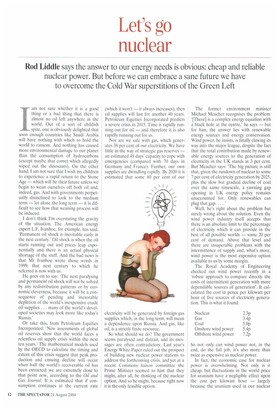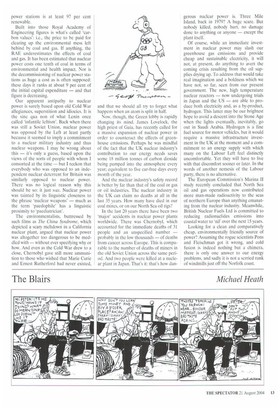Let's go nuclear
Rod Liddle says the answer to our energy needs is obvious: cheap and reliable nuclear power. But before we can embrace a sane future we have to overcome the Cold War superstitions of the Green Left Iam not sure whether it is a good thing or a bad thing that there is almost no oil left anywhere in the world. Out of a sort of childish spite, one is obviously delighted that soon enough countries like Saudi Arabia will have nothing with which to hold the world to ransom. And nothing has caused more environmental damage to our planet than the consumption of hydrocarbons (except maybe that comet which allegedly wiped out the dinosaurs). On the other hand, I am not sure that I wish my children to experience a rapid return to the Stone Age — which will be their future unless we begin to wean ourselves off both oil and, indeed, gas. And with governments perpetually disinclined to look to the medium term — let alone the long term — it is difficult to see how that weaning process will be induced.
I don't think I'm overstating the gravity of the situation. The American energy expert L.F. Ivanhoe, for example, has said, Permanent oil shock is inevitable early in the next century.' Oil shock is when the oil starts running out and prices leap exponentially and there is an actual physical shortage of the stuff. And the bad news is that Mr Ivanhoe wrote those words in 1999: that next century to which he referred is now with us.
He goes on to say: The next paralysing and permanent oil shock will not be solved by any redistribution patterns or by economic cleverness, because it will be a consequence of pending and inexorable depletion of the world's inexpensive crude oil supplies . . . many of the world's developed societies may look more like today's Russia.'
Or take this, from Petroleum Equities Incorporated: 'New assessments of global oil reserves show that the world faces a relentless oil supply crisis within the next ten years.' The mathematical models used by the OECD to calculate the timing and extent of this crisis suggest that peak production and ensuing decline will occur when half the world's recoverable oil has been extracted: we are extremely close to that point now, according to the Oil and Gas Journal. It is estimated that if consumption continues at the current rate (which it won't — it always increases), then oil supplies will last for another 40 years. Petroleum Equities Incorporated predicts a severe crisis in 2015. Time is rapidly running out for oil — and therefore it is also rapidly running out for us.
Nor are we safe with gas, which generates 38 per cent of our electricity. We have little in the way of strategic gas reserves — an estimated 48 days' capacity to cope with emergencies (compared with 70 days in Germany and France). Further, our own supplies are dwindling rapidly. By 2020 it is estimated that some 80 per cent of our electricity will be generated by foreign gas supplies which, in the long term, will mean a dependence upon Russia. And gas, like oil, is a strictly finite resource.
So what should we do? The government seems paralysed and distrait, and its messages are often contradictory. Last year's Energy White Paper ruled out the prospect of building new nuclear power stations to address the forthcoming crisis, and yet at a recent Commons liaison committee the Prime Minister seemed to hint that they might, after all, be thinking of the nuclear option. And so he might, because right now it is the only feasible option. The former environment minister Michael Meacher recognises the problem. Trherel is a complex energy equation with a black hole at the centre,' he says — but for him, the answer lies with renewable energy sources and energy conservation. Wind power, he insists, is finally clawing its way into the major league, despite the fact that the total contribution made by renewable energy sources to the generation of electricity in the UK stands at 3 per cent. But Meacher says: 'The big picture is still that, given the rundown of nuclear to some 7 per cent of electricity generation by 2025, plus the slow but gradual decline of coal over the same timescale, a yawning gap opening in UK energy policy remains unaccounted for. Only renewables can plug that gap. .
Well, he's right about the problem but surely wrong about the solution. Even the wind power industry itself accepts that there is an absolute limit to the percentage of electricity which it can provide in the best of all possible worlds — some 20 per cent of demand. Above that level and there are insuperable problems with the intermittence of supply and, what's more, wind power is the most expensive option available to us by some margin.
The Royal Academy of Engineering checked out wind power recently in a 'robust approach to compare directly the costs of intermittent generation with more dependable sources of generation'. It calculated the cost in pence per kilowatt per hour of five sources of electricity generation. This is what it found: Nuclear 2.3p Gas 3.4p Coal 5.0p Onshore wind power 5.4p Offshore wind power 7.2p So not only can wind power not, in the end, do the full job, it's also more than twice as expensive as nuclear power.
In fact, the economic case for nuclear power is overwhelming. Not only is it cheap, but fluctuations in the world price for uranium have a negligible effect upon the cost per kilowatt hour — largely because the uranium used in our nuclear power stations is at least 97 per cent renewable.
Built into those Royal Academy of Engineering figures is what's called 'carbon values': i.e., the price to be paid for clearing up the environmental mess left behind by coal and gas. If anything, the RAE underestimates the effects of coal and gas. It has been estimated that nuclear power costs one tenth of coal in terms of environmental and health impact. Nor is the decommissioning of nuclear power stations as huge a cost as is often supposed: these days it ranks at about 9 per cent of the initial capital expenditure — and that figure is decreasing.
Our apparent antipathy to nuclear power is surely based upon old Cold War allegiances, superstition and idiocies. It is the sine qua non of what Lenin once called 'infantile leftism'. Back when there was still a Soviet Union, nuclear power was opposed by the Left at least partly because it seemed to imply a commitment to a nuclear military industry and thus nuclear weapons. I may be wrong about this — it's only a guess, based upon the views of the sorts of people with whom I consorted at the time — but I reckon that everybody who was opposed to an independent nuclear deterrent for Britain was similarly opposed to nuclear power. There was no logical reason why this should be so: it just was. Nuclear power was tainted by its linguistic closeness to the phrase 'nuclear weapons' — much as the term 'paedophile' has a linguistic proximity to 'paediatrician'.
• The environmentalists, buttressed by such films as The China Syndrome, which depicted a scary meltdown in a California nuclear plant, argued that nuclear power was altogether too dangerous to be meddled with — without ever specifying why or how. And even as the Cold War drew to a close, Chernobyl gave still more ammunition to those who wished that Marie Curie and Ernest Rutherford had never existed,
and that we should all try to forget what happens when an atom is split in half.
Now, though, the Green lobby is rapidly changing its mind. James Lovelock, the high priest of Gala, has recently called for a massive expansion of nuclear power in order to counteract the effects of greenhouse emissions. Perhaps he was mindful of the fact that the UK nuclear industry's contribution to our energy needs saves some 18 million tonnes of carbon dioxide being pumped into the atmosphere every year; equivalent to five car-free days every month of the year.
And the nuclear industry's safety record is better by far than that of the coal or gas or oil industries. The nuclear industry in the UK can claim no deaths at all in the last 35 years. How many have died in our coal mines, or on our North Sea oil rigs?
In the last 20 years there have been two 'major' accidents in nuclear power plants worldwide. There was Chernobyl, which accounted for the immediate deaths of 31 people and an unspecified number — probably in the low thousands — of deaths from cancer across Europe. This is comparable to the number of deaths of miners in the old Soviet Union across the same period. And two people were killed at a nuclear plant in Japan. That's it: that's how dan
gerous nuclear power is. Three Mile Island, back in 1979? A huge scare. But nobody killed, nobody hurt, no damage done to anything or anyone — except the plant itself.
Of course, while an immediate investment in nuclear power may slash our greenhouse gas emissions and provide cheap and sustainable electricity, it will not, at present, do anything to avert the coming crisis resulting from the oil supplies drying up. To address that would take real imagination and a boldness which we have not, so far, seen from our present government. The new, high temperature nuclear reactors — now undergoing trials in Japan and the US — are able to produce both electricity and, as a by-product, hydrogen. This latter may be our brightest hope to avoid a descent into the Stone Age when the lights eventually, inevitably, go out in Saudi Arabia. Hydrogen is a fine fuel source for motor vehicles, but it would require a massive infrastructure investment in the UK at the moment and a commitment to an energy supply with which many on the Labour Left feel distinctly uncomfortable. Yet they will have to live with that discomfort sooner or later, In the words of another nemesis of the Labour party, there is no alternative.
The European Commission's Marina II study recently concluded that North Sea oil and gas operations now contributed more man-made radioactivity to the seas of northern Europe than anything emanating from the nuclear industry. Meanwhile, British Nuclear Fuels Ltd is committed to reducing radionuclides emissions into coastal water to 'nil' over the next 15 years.
Looking for a clean and comparatively cheap, environmentally friendly source of power? Assuming the rogue scientists Pons and Fleischman got it wrong, and cold fusion is indeed nothing but a chimera, there is only one answer to our energy problems, and sadly it is not a serried rank of windmills just off the Norfolk coast.



























































 Previous page
Previous page